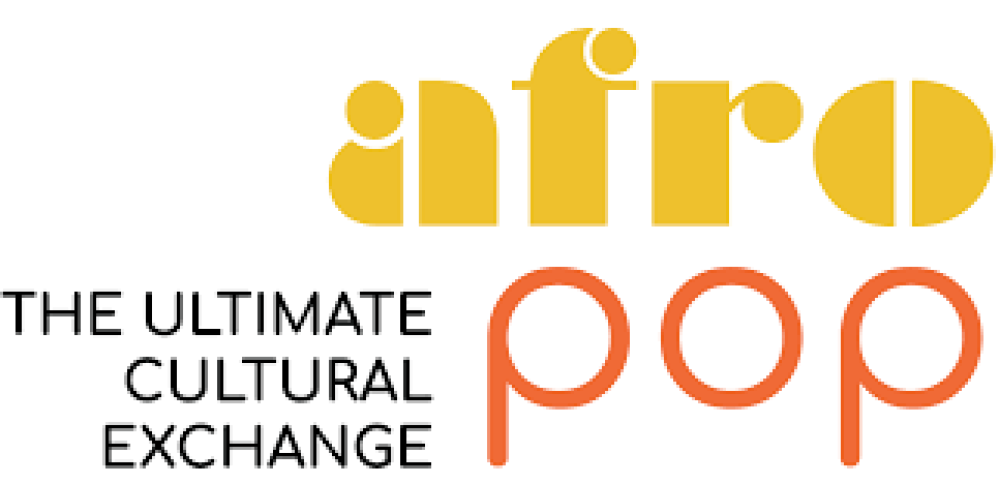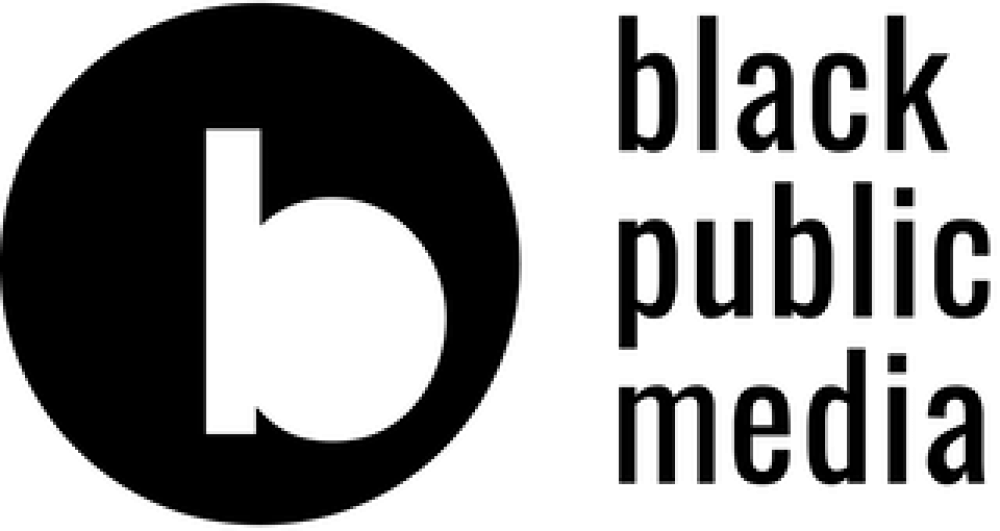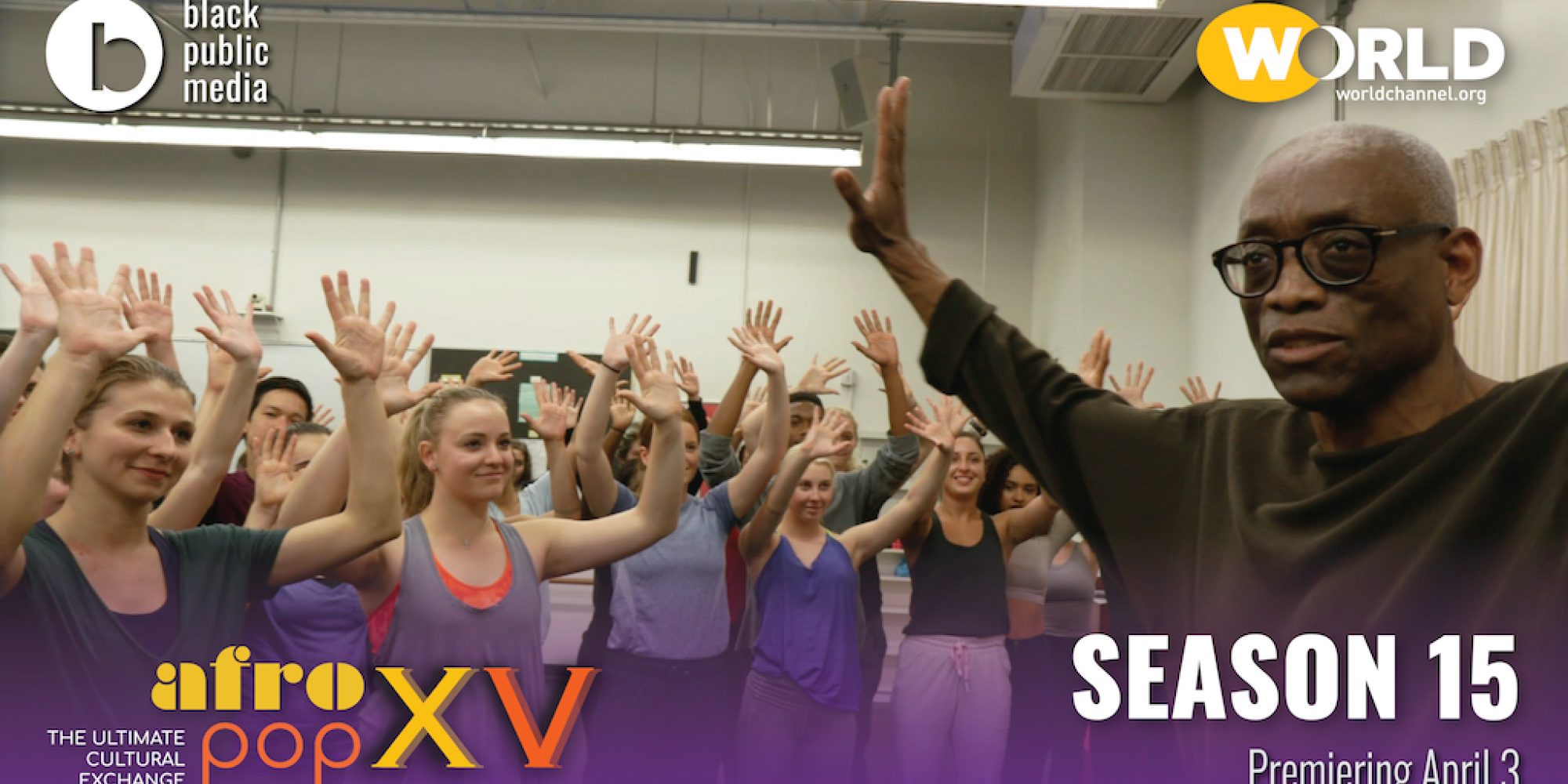This season marks the 15th anniversary of AfroPoP: The Ultimate Cultural Exchange, a documentary series dedicated to spotlighting the stories and lives of people from all corners of the African diaspora. AfroPoP: The Ultimate Cultural Exchange is a public television show and in its 15th year focuses on Black art, is co-produced and presented by Black Public Media and WORLD Channel and distributed and co-presented by American Public Television. Not to get them confused with Afropop Worldwide and World Music Productions, we are ultimately in support of each other's work and we will share their success in bringing the diversity of the Black world to public television by showcasing all five films this season.
The award-winning series presents an entire season centered on a single theme: Black art. The new season's five documentaries kick off on Monday, April 3, with Can You Bring It: Bill T. Jones and D-Man in the Waters by Rosalynde LeBlanc and Tom Hurwitz, an award-winning documentary film about “what it takes to live” according to Bill T. Jones. This feature documentary film had a limited release that began on July 16, 2021 in the midst of the Covid pandemic. Not wanting to be a spoiler by revealing the nuances of the plot or the meaning in the metaphor in the title, let’s just say for now that Can You Bring It: Bill T. Jones and D-Man in the Waters, is a remarkable film with uncanny parallels and eerie coincidences that need no explanation. It is a gripping compelling coming-of-age storytelling where two generations of dancers, 30 years apart, share their grueling creative process in learning the same piece, D-Man in the Waters, a production of Bill T. Jones/Arnie Zane Company.
Set 30 years apart in 1989 and 2019 and told from the multiple first person perspectives from the original surviving cast members including Bill T. Jones himself as a young co-choreographer with his charismatic partner, rehearsing and ultimately performing D-Man in the Waters. The film offers a parallelism in form, with a subplot of young dancers at Loyola Marymount University in 2019, being guided through a process of self-discovery, through pushing their psycho-spiritual and physical limits by their teacher, who was an original member of the Bill T. Jones/Arnie Zane Company, Rosalynde LeBlanc, the co-director of the film. These are the particulars of a story that is set against the backdrop of the HIV/AIDS epidemic described by Simon Watney in The Spectacle of Aids during the regular and systemic misreporting in the early days of HIV/AIDS, as indicative of the international information industry that oscillated between meretricious gloating over the fate of those deemed responsible for their own misfortune, and the supposed threat of a real epidemic. In hindsight, HIV/AIDS can now be classified as a pandemic because according to the World Health Organization (W.H.O.), as of 2021, HIV/AIDS has killed approximately 40.1 million people, and approximately 38.4 million people are infected with HIV globally. Of these 38.4 million people, 75 percent are receiving antiretroviral treatment and Africans, Blacks/African Americans and Hispanics/Latinos are disproportionately affected by HIV compared to other racial and ethnic groups. Also, transgender women who have sex with men are among the groups at highest risk for HIV infection.
This film revives old taboos and brings forth a fresh impasse as we grapple with an existential crisis today we have yet to come through regarding this most recent pandemic. Our own recollections are of the demonization of gay men and Black and Brown bodies at the time, that gave rise to the Act Up Movement and the slogan “Silence Equals Death.” The core of the film does not delve too deeply into any of these political issues but simply explores loss, love and how artists are built to absorb and transmute tragic recollections and reflections and create meaning while those they love are dying. This is a story about the courage to stand in the face of challenges with grace.
AfroPoP: The Ultimate Cultural Exchange series producers Leslie Fields-Cruz and Carol Bash sat down with me briefly and shared their journey with Black Public Media (then known as National Black Programming Consortium). The series’ story began when Fields-Cruz saw the large number of Black documentaries available but without a corresponding programming outlet in the public television sphere. Over the course of its 15 seasons, AfroPoP has brought 87 documentaries to public media audiences. Leslie Fields-Cruz is one of the creators of AfroPoP: The Ultimate Cultural Exchange and currently serves as the co-executive producer of the series (with Chris Hastings of GBH’s WORLD Channel). Carol Bash is the associate producer of AfroPoP: The Ultimate Cultural Exchange. Here is some of our conversation.
Mukwae Wabei Siyolwe: So please tell me more about how this all came together.
Leslie Fields Cruz: Sure. In terms of the history of the series, we’re in our 15th season right now, but when we launched the series, it was really at a time at Black Public Media. I had several documentary films that I had been shopping to the National Public Media, Independent Lens and POV, and they all said, oh, these are great, but we're not going to take them. And I was like, what? And then our distributor, who's been with us since the very beginning, American Public Television, I had sent it to them, and they were like, we like these. We'll distribute them. And then I kind of came back and I was looking at our colleagues at Latino Public Broadcasting who had Voces, and they were creating and they had their own series. And I was like, we should have our own series. And in that way we'll be able to curate the series with the stories that we want to see out there in the world. And so that's really how it started. We put together that first season, and I wasn't sure if it was going to last this long, but it was really because we had these stories that were coming from South Africa, from Nigeria, as well as from the United States, and all of them had an element of cultural exchange to them in terms of either art or travel. And at the time, I was not the executive director, I was the programming director, Jackie Jones was my executive director at the time. And she just said, “Let's go for it. Let's go ahead and have the series.” And we launched it, and it was very successful. We said, let's do it again. And then it was like, let's do it again. Let's do it again. And so now with Denise A. Greene, series producer and director for AfroPoP: The Ultimate Cultural Exchange at the helm and curating the slate, it's just grown and it's beautiful. And this season, I'm incredibly excited about this season.
Wow. And so what are the measures of success? How would you describe that it was so successful? Is it that basically you just got a lot of feedback from. the stations, people, individuals?
We had feedback from stations that were excited about having it. Not all the stations picked it up in that first season, but those that did, they welcomed the fact that we had the series. We also received emails from people who watched it. We don't always receive that many because they will email the station. But I think some of them did a little bit more research and they said, oh, this is this company, let's email them. But we also heard from the filmmakers that were involved that they had their projects featured on the series, and they benefited from that because that meant that people were watching the stories that they wanted out there. So that was part of our success. And then a few years later, we started to submit for awards. We did receive one, I can't remember the name of the first award that we got. It wasn't an Emmy yet, but for one of the short pieces that we had received, an Emmy was Black Enough. So it's just a testament to the need for the diversity of these stories about the Black experience. And we're willing to continue to curate and have those stories put out there. And I think it provides, especially the American public, we all know this, that being Black is not any one thing. It's so diverse, and there are so many different cultural artists, there are so many different social movements. There are so many, there's a million and one stories. And so there's never enough stories as far as I'm concerned. And so when we can identify a documentary that's well told and explores an aspect of the African diaspora that either we know a little bit of or we don't know anything about, then we really want to put it out there. We want it to be part of the series.
Wonderful. And there's been a huge social change, social transition since the pandemic? Are things different for you since then? Do you find that the series is getting much more attention than it did before?
I think so. I think we are, yeah. I'm going to say yes. I do think that we're getting a lot more attention, but I don't think it's just because of the pandemic. I do think that at one point, I would say probably around 2017, 2018 and 2019 the series kind of got in a rut, and I felt like we were bringing in new stories, but so many of them seemed to be connected to the trauma of blackness.
And I was like, this is what this series is about. It really isn't. Some of the stories may have some trauma in it, but it's also about celebration, it's about exploration, it's about exchange. And so we made some decisions. And when Denise came in and started to curate the slate, things started to change a little bit. And I think that it started to increase in its popularity and the fact that we moved it out of the Black History Month zone from, like, Martin Luther King Day to the end of February. We made a conscious choice to move it and launch it in April. The series broadcast begins in April for the premiere. And so that took it out of the Black History month, sort of like a competition of having to try to compete with all of these other types of stories, and it put it out there on its own. And then, of course, we were committed to really trying to market and promote the streaming of these titles so that people who might not be exactly tuned into their local public media station or to WORLD Channel, which is where it premieres, will find it on worldchannel.org or on pbs.org, or they'll come to blackpublicmedia.org and they'll find it on our site. So I think that that has helped to expand our audience in ways that we hadn't thought of before.
Carol Bash: Right, yeah. I'd also like to add that also there's been sort of a reckoning about who tells whose stories and who gets to be the originator of telling African-American or African or Afro-Latino or Afro-Caribbean stories. And the fact that the filmmakers themselves are mostly of the culture sometimes, sometimes not, also makes a difference as to what the perspective is. And we do make a point to really try to identify stories that are being made by Black makers and if it's not a Black maker, that the perspective is really coming from the people who are being featured in the film. So that's definitely something that we try to maintain with the series.
Wow. And then tell me, is there a difference between the National Black Programming Consortium and Black Public Media? Are you related to them in any kind of way?
Leslie Fields Cruz: We're the same thing, right. We used to be. When the series was founded, we were the National Black Programming Consortium. And then in 2017, we had our website which was blackpublicmedia.org, and then we, you know, we did the whole branding thing and people said, just name yourselves Black Public Media. So we said, 0.K., so that's what we did. But we're NBPC. We've been around for 40 plus years.
That's incredible. Yes, I'm your generation. I remember the days when I used to have to fly all the way to New York to go and see any Black programming at the African Diaspora Film Festival and African Film Festival, and that was it. And then you sit in the movie theater just, like, blown away, like, oh, my gosh, look at who we are. We are just everywhere, and we don't see that in the mainstream at all. So when I sort of realized that maybe you were the same people that were back in the day, National Black Programming Consortium, and that you were back, I was like, wow, O.K., I need to interview these sisters and see what's going on and see how we can help each other. Because the irony is that we're named Afropop Worldwide, and your series is called AfroPoP. So I wanted to also just to find an opportunity to see how we can promote you, but also at the same time elevate you and differentiate us from you, so that we support each other. But we're different, right?
Yeah. It's funny because we get oftentimes they’re, like, wait, you guys are Afropop Worldwide? I'm like. No. We're AfroPoP. And I actually like to tell people we're AfroPoP: The Ultimate Cultural Exchange. Like, that's the full title of the series so that people know that Afropop Worldwide is the radio show or podcast. And I say, and we're a public television show. That's where we are. I know there were early conversations when we initially launched, when our show launched, because in that first season, we had a couple of pieces that had to do with music, but the mix just wasn't right at that point in time. And I think that there wasn't as much of a convergence in terms of the platforms and the media that was going on that we see right now. So I think it'd be a great opportunity for us to work together. To explore ways that we can support each other, but also make sure that people understand we are different.
Can You Bring It: Bill T. Jones and D-Man in the Waters, the first film in the current series produced by AfroPoP: The Ultimate Cultural Exchange, begins streaming exclusively on https://worldchannel.org/show/afropop/, the Black Public Media YouTube Channel and the WORLD YouTube Channel at 12 midnight (Eastern) on April 3. Later that day, at 8:00 p.m. Eastern Can You Bring It: Bill T. Jones and D-Man in the Waters will have its national television premiere on WORLD Channel (viewers can check their local listings for their local WORLD station). All other episodes of AfroPoP season 15 that includes Queen Kidjo by Claire Duguet; Bill Traylor: Chasing Ghosts by Jeffrey Wolf; The Sound of Masks by Sara CF de Gouveia; and Rewind & Play by Alain Gomis will also begin streaming at 12 midnight E.T. on April 3.
Episodes 2 through 5 can be streamed at https://worldchannel.org/show/afropop/, the Black Public Media YouTube Channel and the WORLD YouTube Channel and on all station-branded PBS platforms, including PBS.org and the PBS app.
On television, a new episode of AfroPoP season 15 will broadcast on WORLD Channel each Monday at 8:00 p.m. Eastern, April 3 through May 1.












